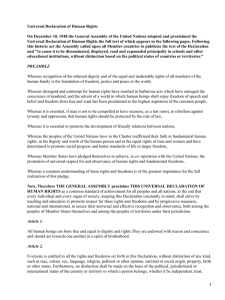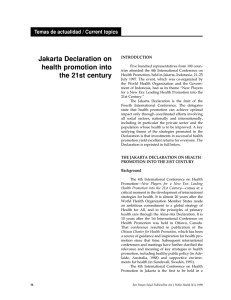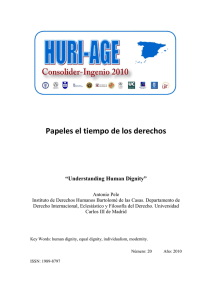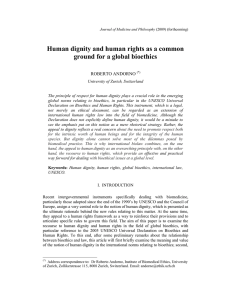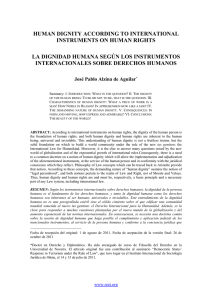The Concept of `Human Dignity` in the Post
Anuncio
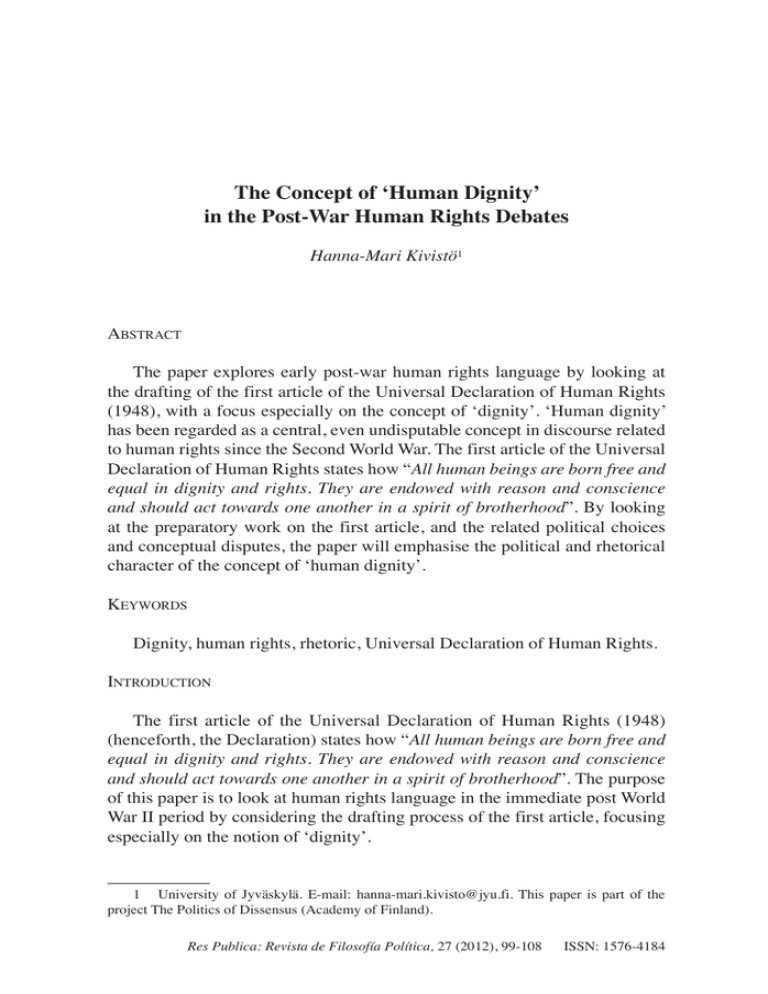
The Concept of ‘Human Dignity’ in the Post-War Human Rights Debates 99 The Concept of ‘Human Dignity’ in the Post-War Human Rights Debates Hanna-Mari Kivistö1 Abstract The paper explores early post-war human rights language by looking at the drafting of the first article of the Universal Declaration of Human Rights (1948), with a focus especially on the concept of ‘dignity’. ‘Human dignity’ has been regarded as a central, even undisputable concept in discourse related to human rights since the Second World War. The first article of the Universal Declaration of Human Rights states how “All human beings are born free and equal in dignity and rights. They are endowed with reason and conscience and should act towards one another in a spirit of brotherhood”. By looking at the preparatory work on the first article, and the related political choices and conceptual disputes, the paper will emphasise the political and rhetorical character of the concept of ‘human dignity’. Keywords Dignity, human rights, rhetoric, Universal Declaration of Human Rights. Introduction The first article of the Universal Declaration of Human Rights (1948) (henceforth, the Declaration) states how “All human beings are born free and equal in dignity and rights. They are endowed with reason and conscience and should act towards one another in a spirit of brotherhood”. The purpose of this paper is to look at human rights language in the immediate post World War II period by considering the drafting process of the first article, focusing especially on the notion of ‘dignity’. 1 University of Jyväskylä. E-mail: [email protected]. This paper is part of the project The Politics of Dissensus (Academy of Finland). Res Publica: Revista de Filosofía Política, 27 (2012), 99-108 ISSN: 1576-4184 100 Hanna-Mari Kivistö The idea of human dignity is old, with various theological and philosophical roots (see e.g. Sensen 2011). After the Second World War ‘human dignity’ became a central concept in human rights discourse and a key concept of legal language both at the international level as well as in domestic constitutions. A famous example of the latter is the 1949 Grundgesetz of the Federal Republic of Germany, which affirms the inviolability of human dignity in its first article.2 During the drafting process of the Declaration, the first article was emphasised as the foundation for the document. René Cassin stated that the Article 1 was the framework “within which all the rights that followed were contained” (A/C.3/SR.96, 99). The Declaration refers to human dignity as the justification for other rights claims (see also Sensen 2011). The paper will look into the political choices and conceptual disputes behind the creation of the first article of the Declaration, and by doing so it hopes to shed light on the rhetorical and political continuities and discontinuities related to the dignity concept in the post war debates. In addition to offering a brief interpretation of the political history of the first article, the paper aims also to say something more general about the politics of drafting and negotiating, with reference to the UN debates used as the primary reference material. Drafting the Universal Declaration of Human Rights The Preamble of the 1945 Charter of the United Nations calls on states “to reaffirm faith in fundamental human rights, in the dignity and worth of the human person, in the equal rights of men and women and of nations large and small”.3 According to Chaskalson (2002, 133) the wording was a radical move, as it was the first time the idea of dignity was proclaimed in a document of international law. Although it had been codified in the legal systems of some states already before the war, ‘human dignity’ became a prominent concept of legal language only in 1940s (Dicke 2002, 112). The movement for human rights, inspired in part by Roosevelt’s “Four Freedoms”, resulted in different drafts of the “International Bill of Rights” written by individuals and various organisations. Some of these drafts included a reference to dignity, albeit with differing kinds of dignity conceptions, stemming from different religious and philosophical traditions (ibid., 112-14). 2 The Article 1(1) of the 1949 Basic Law for the Federal Republic of Germany: “Human dignity shall be inviolable. To respect and protect it shall be the duty of all state authority.” 3 The Charter of the United Nations, 24 October 1945. Res Publica: Revista de Filosofía Política, 27 (2012), 99-108 ISSN: 1576-4184 The Concept of ‘Human Dignity’ in the Post-War Human Rights Debates 101 Even if the Declaration marks a historical turning point and is a standard-setting document in human rights discussions, it is perhaps surprising to notice that human rights were rather peripheral in the early days of the United Nations, which was established for maintaining of post-war international peace and security (see Glendon 2002, xv). The UN Charter of 1945, however, set up a Human Rights Commission, which agreed to draft a bill of rights (Hunt 2007, 203). The Commission was chaired by Eleanor Roosevelt, who undoubtedly is one of the most famous figures in the early history of the Declaration. Among the other members of the Commission were names such as René Cassin and John Peter Humphrey. Humphrey was the director of the Division of Human Rights and wrote the first draft of the Declaration (Hunt 2007, 203; Morsink 1999, 28-9). Before the General Assembly finally approved the Declaration on December 10, 1948, the drafting process had gone through several stages and various forums. Apart from the Commission on Human Rights, the draft was circulated in the member states, and it was approved by the Economic and Social Council. The Third Committee on Social, Humanitarian and Cultural Affairs debated the document and its various articles thoroughly. These debates comprise the main reference material of this paper. Although it might well be that the “origins of documents do not necessarily tell us something significant about their consequences”, as Hunt (2007, 18) argues, the point in studying the drafting documents from a rhetorical and conceptual perspective is rather that such documents are primary sources when looking into the complexities, controversies and compromises behind particular concepts or labels. Another point to emphasise in relation to the preparatory work is that the drafting debates and negotiations –which could also be characterised as quasi-parliamentary– produce a first-hand picture of the particular time in focus, of its political constellations and of the contemporary political language (see Ihalainen & Palonen 2009). A further point in relation to studying the preparatory work is that, by using such material, one can construct a reading that shows the historical contingency related to the concepts and conventions, especially those that might seem normative, or even ‘foundational’ from today’s perspective, such as the concept of ‘human dignity’. Glendon (2002) speaks of the post-war window of opportunity when major institutions such as the United Nations could be established before the dividing lines between the Cold War blocks became too great. Those who gathered together to draft the Declaration came from diverse cultural, linguistic and political backgrounds (Glendon 2002, xix). This aspect, related to the politics of negotiating, drafting and defining, is wonderfully covered by Eleanor Roosevelt, who, when discussing the preRes Publica: Revista de Filosofía Política, 27 (2012), 99-108 ISSN: 1576-4184 102 Hanna-Mari Kivistö paratory debates of the Declaration, writes: “Perhaps one of the things that some of us learned was that in international documents you must try to find words that can be accepted by the greatest number of people. Not the words you would choose as the perfect words, but the words that most people can say and that will accomplish the ends you will desire, and will be acceptable to practically everyone sitting around the table, no matter what their background, no matter what their beliefs might be” (Roosevelt 1995, 560). Post-War Natural Rights Language The Preamble to the Universal Declaration of Human Rights speaks of the “recognition of the inherent dignity and of the equal and inalienable rights of all members of the human family”. The phrase “all members of the human family” refers to the idea of the universality of the document. Terms such as “inherent”, “inalienable”, “born free and equal” make references to the idea of natural rights (Morsink 1984, 333) and, as several scholars have noted, echo the language of the declarations of the eighteenth century. Article 1 of the French Declaration of the Rights of Man and of the Citizen (1789), for example, proclaimed that “Men are born and remain free and equal in rights” (see Hunt 2007, 17; Morsink 1984). It should, however, be noted that in listing the rights, the 1948 Declaration goes much further than its Enlightenment predecessors (Morsink 1999). The post-war era brought about the revival of natural law language as a counter-reaction to positivism, which had dominated legal thinking during the latter part of the previous century and the first decade of the twentieth century (see Kelsen 1957, 174). Although having various philosophical and religious roots, a key idea in natural rights thinking is, as Morsink (1984, 333) explains, that human beings posses certain moral rights on the basis of being human, and these rights thus exist prior to the rights expressed in the systems of positive law. Their “origin does not lie in the legal enactments of states or legislatures, but in the nature and order of things, especially the nature of man” (ibid.). According to Jacques Maritain, a Catholic natural law philosopher who was also involved in the drafting of the Declaration, “the human person possesses rights because of the very fact that it is a person, a whole, a master of itself and of its acts, and which consequently is not merely a means to an end, but an end, an end which must be treated as such” (Maritain 1949, 65). To Maritain the expression “dignity of human person” “means nothing if it does not signify that by virtue of natural law, the human person has the right to be respected, is the subject of rights, possesses rights. There are things which are owed to man because of the very fact that he is man” (ibid.). Res Publica: Revista de Filosofía Política, 27 (2012), 99-108 ISSN: 1576-4184 The Concept of ‘Human Dignity’ in the Post-War Human Rights Debates 103 As Dicke (2002) writes, the Universal Declaration of Human Rights refers to the “recognition” of dignity as the foundation for freedom, justice and peace. The idea is that there is an obligation to recognise dignity, but importantly, recognition does not constitute human dignity, nor does the notion of dignity need recognition to exist (Dicke 2002, 114). Inherent dignity is thus understood as a quality possessed by “all members of the human family” independently of the state. The purpose of the following section is to look into conceptual disputes related to dignity in the drafting of the first article of the Declaration. It makes references especially to the debates of the Third Committee, which took place in Paris in autumn 1948. The Third Committee consisted of representatives of the 58 UN member states, and it considered the draft International Declaration of Human Rights prepared by the Commission on Human Rights.4 The deliberations on the first article lasted several days. Glendon (2002) quotes Roosevelt who, unhappy with the lengthy debates in the Committee, writes how the numerous delegates debated “every single word of that draft declaration over and over again” (Glendon 2002, 143). Deliberating over the First Article The Preamble to the Universal Declaration of Human Rights states how “disregard and contempt for human rights have resulted in barbarous acts which have outraged the conscience of mankind”. The Declaration was thoroughly shaped by the experiences of the past, and against that politico-historical backdrop, its preamble and first article references to human dignity make a strong statement by itself. According to René Cassin, the text of his early draft declaration5 “alluded to the three fundamental questions of liberty, equality, and fraternity because, during the war, these great fundamental principles of mankind had been forgotten” (E/CN.4/AC.I/SR.8, 2). Roosevelt explained that the Human Rights Commission had included the word “dignity” “in order to emphasize the inherent dignity of all mankind” (A/C.3/SR.98, 110). In the Third Committee deliberations Cassin opposed suggestions that the principles of Article 1 should be transferred to the Preamble, or that the ideas in general would be too well known to need to be repeated in the text of the Declaration. He emphasised how “within the preceding ten years, millions of men had lost their lives precisely because those 4 The drafting documents referred to in this article can be found online at http://www. un.org/Depts/dhl/udhr/meetings_1946_nuclear.shtml 5 The draft text for Article 1: “All men are brothers. Being endowed with reason, members of one family they are free and possess equal dignity and rights”. Commission on Human Rights, drafting committee. Draft International Declaration of Rights, 16 June 1947. E/C.4/AC.1/W.1 Res Publica: Revista de Filosofía Política, 27 (2012), 99-108 ISSN: 1576-4184 104 Hanna-Mari Kivistö principles had been ruthlessly flouted. Barbarism, which men had thought safely buried, had risen once more to stalk the world. It was essential that the United Nations should again proclaim to mankind those principles which had come so close to extinction and should explicitly refute the abominable doctrine of fascism” (A/C.3/SR.96, 99). Although the first article of the Declaration has similarities with the eighteenth century language of natural rights, its wording makes no reference to any transcendent source for rights, as opposed to the Enlightenment declarations (see Morsink 1999, 282). It is, however, interesting to notice that the drafts of the Commission on Human Rights (“the Geneva Draft” 1947; “the Lake Success Draft” 1948) both contained a reference to nature with the wording: “All human beings are by nature free and equal”6 (E/600; E/800). Further, the Brazilian proposal for Article 1 included an amendment stating that all human beings were “created in the image and likeness of God”7 (A/C.3/215) (see also Morsink 1999). The above-mentioned wordings sparked a lively debate in the Third Committee. The delegate of Belgium, Henry Carton de Wiart, for example, opposed the phrase “by nature”, claiming that it was “ambiguous and would lead to long, philosophical arguments”. According to him, the reference to God in the Brazilian amendment was of “particularly delicate character” (A/C.3/ SR.96, 96). The representative of China, P.C. Chang, supported the Belgian position to delete the phrase “by nature”, stating that the measure “would obviate any theological question, which could not and should not be raised in a declaration designed to be universally applicable”. He referred to the ideals and traditions that the population of China had, which were different from those of the Christian West. Even if the ideals and traditions were regarded to be of utmost importance, he would refrain from proposing that they should be mentioned in the document. He hoped that “his colleagues would show equal consideration and withdraw some of the amendments to article 1 which raised metaphysical problems” (A/C.3/SR.96, 98). Chang later referred to eighteenth century philosophies about the nature of man, which according to him should be understood as the basis for Article 1. Chang saw no contradiction between the “eighteenth century idea of goodness of man’s essential nature and the idea of a soul given to man by God”. According to him, “If the words ‘by nature’ were deleted, those who believed 6 The draft article: “All human beings are born free and equal in dignity and rights. They are endowed by nature with reason and conscience, and should act towards one another in a spirit of brotherhood.” 7 “Created in the image and likeness to God, they are endowed with reason and conscience, and should act towards one another in the spirit of brotherhood”. Res Publica: Revista de Filosofía Política, 27 (2012), 99-108 ISSN: 1576-4184 The Concept of ‘Human Dignity’ in the Post-War Human Rights Debates 105 in God could still find in the strong opening assertion of the article the idea of God, and at the same time others with different concepts would be able to accept the text” (A/C.3/SR.98, 113-14). Jorge Carrera Andrade, the representative of Ecuador, emphasised the first article “as a doctrinal statement, rather than a statement of human rights”. He saw that “in many parts of the world, men were not born free and equal”, and the Declaration was “to remedy that situation”. He did not support the Brazilian amendment and argued that there should be distinction between the “divine” and the “human”, and the drafters should refrain from “placing the divine on the political plan by introducing it into the declaration”, as the Declaration was intended for people of all faiths (A/C.3/SR.96, 100). In contrast to the Ecuadorian perspective, the representative of Argentina, Enrique V. Corominas, did not see any conflict between religion and politics. According to him the Brazilian amendment had “no intention of imposing any one philosophy of faith on any group or human being”. He emphasised that the first article of the draft declaration, i.e. prior to the reference to God, “constituted a dogma rather than a statement of rights”. He felt a reference to God would give the article additional strength: “It would then rise above mere politics and bring peace and tranquillity to the soul of man”. As freedom of religion was guaranteed in one of the subsequent articles, he pointed out that “all groups of human beings could still profess whatever faith or philosophy they chose”. Reference to God would, however, give the first article “an element of universality, a breath of the divine” (A/C.3/SR.98, 109). One of the delegates of France, Salymon Grumbach, rejected the Brazilian amendment by stating that it was not appropriate to include a statement on human origins to which all representatives could not agree. According to him “the Committee’s essential aim was to reach agreement on fundamental principles, which could be put into practice” and “endorsed by believers as well as non-believers”. He referred to Jacques Maritain as “the great Catholic”, who had stated that “the nations should try to reach agreement on a declaration of human rights, but that it was useless to try to reach agreement on the origin of these rights” (A/C.3/SR.99, 116-17). The representative of India, Lakshmi Menon, emphasised the idea of universality by stating that “although different countries had different beliefs and political systems, they shared the same ideals of social justice and freedom”. The purpose of the Declaration for him “was to set forth those ideals and find a basis for agreement acceptable for all” (A/C.3/SR.99, 116). Not all representatives, however, agreed with the notion of universality. C.T. Te Water of South Africa caused controversy when expressing his opposition to the universal application of dignity by claiming that “there could be no universality in the concept of equality, there could not be, neither was Res Publica: Revista de Filosofía Política, 27 (2012), 99-108 ISSN: 1576-4184 106 Hanna-Mari Kivistö there, any universal standard among the peoples of the world in their different concepts of human dignity, which were, surely, determined by the differences in religious and social systems, usages and customs” (A/C.3/SR.95, 92). The representative of Saudi Arabia, Jamil Baroody, claimed that the idea that all human beings were endowed with reason and conscience was “too broad a statement, one that was not, and had never been true”. According to him, using the words “dignity and rights” in the first sentence was “too ambiguous and had different meanings in different countries” (A/C.3/SR.99, 122). Cassin replied to Baroody by saying that the Committee, as “representative of the human community”, was “competent to proclaim such an ideal” (A/C.3/ SR.99, 124). As Morsink (1984, 316) notes, another important expression for the first article, and one that underlines the conception that dignity belongs to everyone independently of the acts of law-makers, is the wording “are born”. The expression was much disputed in the Third Committee. For example, the representative of Iraq, A. Abadi, claimed that the authors of the first article of the draft declaration had been “carried away by its emotional content”, their definition being “reminiscent of Rousseau and of the French revolution”, but lacking clarity and originality. The Iraqi proposal was to replace the phrase “are born” with the phrase “should be free and equal”8 (A/C.3/SR.96, 100). To the representative of the USSR, Alexei Pavlov, “the theory that all men were born free and equal represented a somewhat shaky basis for the declaration”. According to him, the equality of rights before the law was not determined by birth, but by the social structure of the state and the law. Human beings had to be considered as members of society, and that status determined their rights and duties. He also criticised the phrase “spirit of brotherhood” by referring to the exploitation of weak nations by strong ones. Accordingly, Pavlov argued that the drafters should not be hypocritical, and that the first article “should be realistic and state only what existed or could be attained at the current state of the human development” (A/C.3/SR.98, 110). The phrase “are born” shows clearly the differing rights conceptions of the drafters. To Pavlov no rights could exist beyond the state; there were no ‘inherent’ human rights. The representative of Bolivia, Eduardo Anze Matienzo, criticised this position and, as a response to the Soviet critique of the term “brotherhood”, he noted that the draft declaration did not claim that human beings were perfect. Rather, the declaration was “designed to set a goal for mankind” and it should “inspire men to transform into realities the principles it proclaimed” (A/C.3/SR.98, 112-13). 8 The Iraqi proposal for Article 1: “All men should be free and equal in dignity and worth and should be entitled to similar treatment and equal opportunities” (A/C.3/237). Res Publica: Revista de Filosofía Política, 27 (2012), 99-108 ISSN: 1576-4184 The Concept of ‘Human Dignity’ in the Post-War Human Rights Debates 107 Grumbach of France later returned to answer the Soviet critique and to defend the wording “are born”. He stressed that all representatives knew that inequality existed, but the point was that “the right to freedom and equality was inherent from the moment of birth”. Grumbach made reference to the drafters of the “Declaration of the Rights of Man and of the Citizen” who “had fully realised the existence of inequality and social injustice, but they felt it essential to affirm their belief in man’s inherent right to equality and freedom” (A/C.3/SR.99, 116), emphasising thus the importance of the ideals which the Universal Declaration of Human Rights proclaimed, as well as the political character of the act of declaring such ideals. Concluding Remarks The idea of this paper has been to explore the human rights language in the immediate post-war period by looking into the drafting process of Article 1 of the Universal Declaration of Human Rights, with reference especially to the concept of ‘human dignity’. Studying the drafting documents shows the rhetoric, political choices and historical contingencies related to the concept of dignity in the Declaration. The first article and its language should be understood in its post-war politicohistorical context, including the political experiences that were the driving force behind its creation. It should also be emphasised that the final wording of Article 1 does not refer, for example, to any transcendent source of rights. Although these issues were addressed and debated during the drafting stages, and differing perspectives were presented, the drafters were very particular in providing a wording that could be acceptable to representatives from various political, philosophical and religious backgrounds. Accordingly, the concept of dignity was also kept obscure and open-ended. The rhetoric related to natural rights embraces the universality of the notion of dignity. Dignity is emphasised as something that is to be recognised, belongs to everyone and is intended to justify the rights claims of the document. References Chaskalson, Arthur 2002: “Human Dignity as a Constitutional Value”, in David Kretzmer & Eckart Klein, eds., The Concept of Human Dignity in Human Rights Discourse. The Hague: Kluwer Law International. Dicke, Klaus 2002: “The Founding Function of Human Dignity in the Universal Declaration of Human Rights”, in David Kretzmer & Eckart Klein, eds., The Concept of Human Dignity in Human Rights Discourse. The Hague: Kluwer Law International. Res Publica: Revista de Filosofía Política, 27 (2012), 99-108 ISSN: 1576-4184 108 Hanna-Mari Kivistö Glendon, Mary Ann 2002: A World Made New: Eleanor Roosevelt and the Universal Declaration of Human Rights. New York: Random House. Hunt, Lynn 2007: Inventing Human Rights: A History. New York: Norton. Ihalainen, Pasi & Kari Palonen 2009: “Parliamentary sources in the comparative study of conceptual history: methodological aspects and illustrations of a research proposal”, Parliament, Estates & Representation, 29, 17-34. Kelsen, Hans 1957: What is Justice? Justice, Law, and Politics in the Mirror of Science. Berkeley: University of California Press. Maritain, Jacques 1949: The Rights of Man and Natural Law. New York: Scribner. Morsink, Johannes 1984: “The Philosophy of the Universal Declaration”, Human Rights Quarterly, 6:3, 309-34. Morsink, Johannes 1999: The Universal Declaration of Human Rights: Origins, Drafting and Intent. Philadelphia: University of Pennsylvania Press. Roosevelt, Eleanor 1995: What I Hope to Leave Behind. The Essential Essays of Eleanor Roosevelt, edited with an introduction by Allida M. Black; preface by Blanche Wiesen Cook. New York: Carlson Publishing. Sensen, Oliver 2011: “Human Dignity in Historical Perspective: The Contemporary and Traditional Paradigms”, European Journal of Political Theory, 10:1, 71-91. Res Publica: Revista de Filosofía Política, 27 (2012), 99-108 ISSN: 1576-4184
